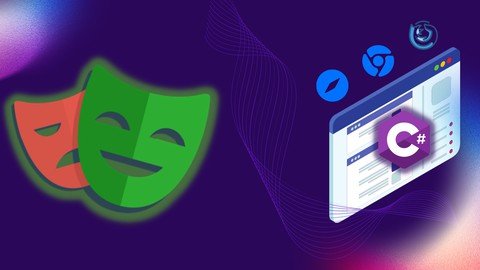
Published 4/2023
MP4 | Video: h264, 1280×720 | Audio: AAC, 44.1 KHz
Language: English | Size: 4.33 GB | Duration: 9h 26m
An End-to-End Playwright automation framework development course
What you’ll learn
Basics of Playwright to more advanced way to write custom frameworks in Playwright
Modern testing techniques and coding standards in .NET
Efficient DI based framework creation
Working with XUnit, AutoFixture, DI and Specflow will make testing with Playwright more awesome
Requirements
Basics of .NET
Basics of Selenium or any related tool is a plus
Description
Automation framework development with Playwright in C#.NET is an advanced course designed to address End-to-End test framework development with clean coding and SOLID patterns in place.The curriculum of this course is designed not just by randomly choosing some of the topics that I know, the course has evolved over a period (15+ years) by giving training to more than 270,000+ professionals (both online and corporate training) and working in automation testing field 15+ years nowHence the course is much-refined version, meaning the course won’t deviate from the topics it is meant to be.The course includes all the source codes which we will discuss in the course, hence one must have all the source codes required at the end of every section.Finally, the course is for those, who are serious about automation testing framework development from the complete ground up and understand all the nuts and bots of building them for extensible usage at workIn this course, you will learn to automate ASP NET Web API and WebUI projects using tools such as Playwright (latest version).NET 7C# 11XUnitAutoFixtureFluent AssertionSpecflowWe will also be using the following patterns in this courseDependency InjectionFactory PatternPage Object Model PatternLazy InitializationAt the end of this course, you will haveComplete understanding of C# with .NET 7 Complete understanding of Playwright with latest and greatest changesDesigning a complete framework from the ground upAll the idea to design a more extendable framework
Overview
Section 1: Introduction
Lecture 1 Introduction
Section 2: Application Under Test
Lecture 2 Running Application Under Test
Lecture 3 Source
Section 3: Building Core Framework Components
Lecture 4 Creating Framework Structure
Lecture 5 Creating Playwright Driver
Lecture 6 Invoking Playwright Driver from Test Project
Lecture 7 Safe way to Dispose Playwright Driver Object
Lecture 8 Source code
Lecture 9 Understanding the Problem with classical code and improving it
Lecture 10 Extending Playwright Driver with Playwright Driver Initialiser
Lecture 11 Creating Abstract Interface for Playwright Driver Initialiser
Lecture 12 Creating Playwright Driver with Different browser initialiser
Lecture 13 Running them all together
Lecture 14 Extending Playwright Driver with Lazy initialisation
Lecture 15 Summary
Lecture 16 Source
Section 4: Building Configuration Component for Framework
Lecture 17 Introduction
Lecture 18 Creating Config Reader
Lecture 19 Executing Code with Configuration
Section 5: Writing Test Code with better code patterns
Lecture 20 Creating Test along with Record and Playback
Lecture 21 Creating Page Object Model
Lecture 22 Creating Page Object Model (Contd)
Lecture 23 Running Page Object Model based code in Test
Lecture 24 Assertion with Expect Library of Playwright
Section 6: Data Driven Testing
Lecture 25 Data Driven Testing with Inline Data
Lecture 26 Data Driven Testing with Concrete Data Type
Lecture 27 Automatic Test Data Creation for Test cases
Section 7: Dependency Injection of code (Framework and Test)
Lecture 28 Introduction to DI
Lecture 29 XUnit Dependency Injection
Lecture 30 Dependency Injection of Playwright Driver
Lecture 31 Dependency Injection of Page Object Model Code
Lecture 32 Understanding Separation of concern and implementing them
Section 8: Building Specflow Tests
Lecture 33 Introduction and Installation
Lecture 34 Bringing Pages and Models from existing code
Lecture 35 Implementing Step Definitions
Lecture 36 Implementing Step definitions and running tests
Lecture 37 Specflow Living Documentation
Lecture 38 Summary
Section 9: Misc Awesome Features of Playwright
Lecture 39 Running Tests with Command line
Lecture 40 Interactive Debugging of code
Lecture 41 Running Tests in Parallel and Sequence
Section 10:[Crash Course] – Playwright with C# .NET Basics
Lecture 42 Introduction and getting started with Playwright
Lecture 43 Playwright NUnit Framework support
Lecture 44 Understanding and working with locators
Lecture 45 Working with Playwright CLI
Lecture 46 Auto-Waiting Mechanism
Lecture 47 Page Object Model in Playwright
Lecture 48 Listening Network events and testing the event details
Lecture 49 Testing Adobe or Google Analytics with Playwright
Lecture 50 Intercepting Networks
Section 11:[Crash Course] – Playwright with Specflow
Lecture 51 Introduction
Lecture 52 Creating Reusable Playwright Driver object
Lecture 53 Implementing Specflow Step Definitions for Scenario
Lecture 54 Running Specflow Scenarios
Lecture 55 Parallel Execution of Specflow Test run
Section 12:[Crash Course] – API Testing with Playwright
Lecture 56 Introduction and getting started
Lecture 57 POST operation with Bearer Token Auth
Lecture 58 Deserialising Response object
Lecture 59 GET Operation with Auth token Header
Lecture 60 Deserialize response to Concrete Object Type
Section 13:[Crash Course] – XUnit with Selenium, AutoFixture and Fluent Assertions
Lecture 61 Introduction to XUnit
Lecture 62 XUnit Context Injection and creating Fixture class to create and dispose object
Lecture 63 Data Driven Testing with XUnit using[InlineData]
Lecture 64 DDT with[MemberData] and customizing it for[Theory]
Lecture 65 Running XUnit Tests in Parallel and in Sequence
Lecture 66 Testing application for Failures and how to make it happen?
Lecture 67 Introduction to Fluent Assertions
Lecture 68 Introduction to[AutoFixture] for automation data setup for each tests
Lecture 69 Customized Test Data creation using Builder Pattern of AutoFixture
Lecture 70 Populate Test Data with[AutoData] of AutoFixture in XUnit and Selenium tests
Lecture 71 Extending TestDataAttribute for Custom data in XUnit with Selenium tests
Section 14:[Crash Course] – Specflow with .NET
Lecture 72 Introduction
Lecture 73 Installation and getting started
Lecture 74 Working with Specflow tables for Data Driven Testing
Lecture 75 Specflow Hooks
Lecture 76 Working with Dynamic Test Data with AutoFixture
Lecture 77 Step Argument of Specflow to transform an specific step
Lecture 78 Specflow with C# 10 features
Lecture 79 Context Injection of Specflow
QA,BA,Dev,DevOps
Password/解压密码www.tbtos.com
转载请注明:0daytown » Advanced Framework Development With Playwright In C# .Net